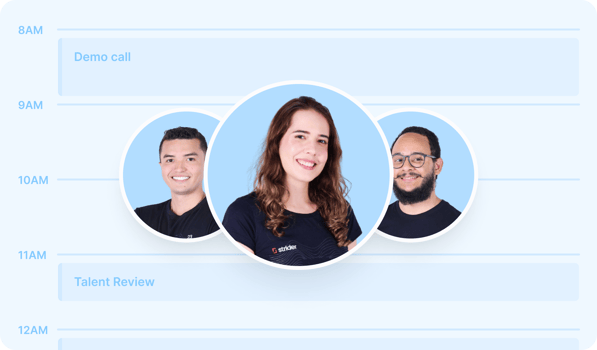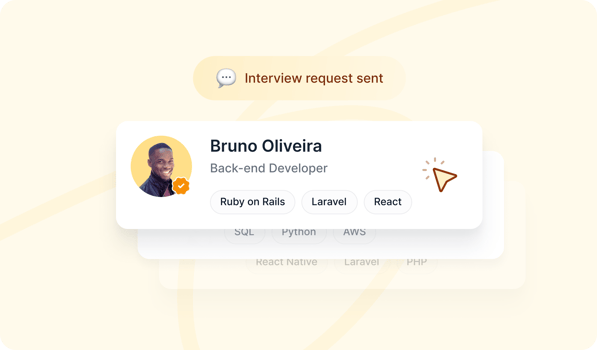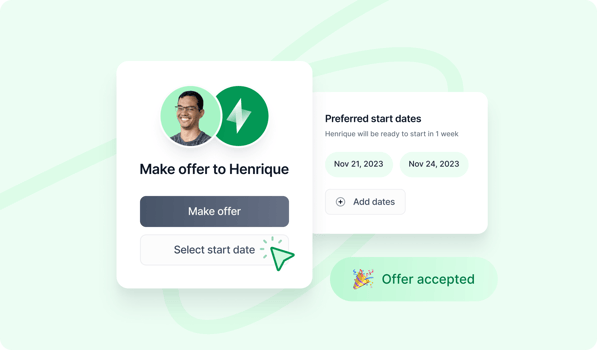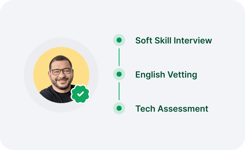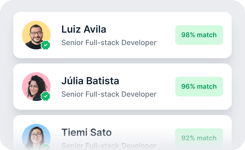Hire Remote Software Engineers Remotely in 2025
Software engineers are the core of the tech world, continuously pushing the boundaries of innovation and driving digital transformation in different industries. They are the wizards behind the scenes, creating and maintaining software applications that make our lives easier and more efficient. In today's tech-driven world, their skills are in high demand as businesses and organizations rely heavily on technology to stay competitive and deliver exceptional experiences to their customers. Software engineers are the driving force behind the incredible advancements we see in the digital landscape.
As businesses continue to embrace remote work options, hiring freelance software developers has become an attractive option. Remote hiring offers access to a global talent pool, allowing organizations to tap into diverse skill sets and expertise of freelance developers, regardless of geographical boundaries.
What to look for when hiring Software Engineers?
A software engineer must possess a mix of soft skills, technical skills, and specialized skills to excel at software development:
Technical skills
Programming Languages:
Proficiency in multiple programming languages is essential for a software engineer. They should have a strong command over languages such as Java, Python, C++, C#, or JavaScript. These languages are widely used in various domains and offer versatility in software development.
Software Development Frameworks:
A software engineer should be familiar with popular software development frameworks such as Spring, Django, .NET, or Ruby on Rails. These frameworks provide developers with pre-built components, libraries, and tools that expedite the development process.
Web technologies:
A proficient software engineer possesses expertise in front-end technologies like HTML, CSS, and JavaScript. They should also have experience with web frameworks like React, Angular, or Vue.js. Frameworks like React, Angular, and Vue.js simplify complex web development tasks, offering reusable components, efficient rendering, and state management capabilities.
Database Management:
Understanding database concepts, SQL query language, and experience with databases like MySQL, PostgreSQL, MongoDB, or Oracle is crucial for a software engineer. Proficiency in SQL allows software developers to perform operations like querying, inserting, updating, and deleting data. Popular databases like MySQL, PostgreSQL, MongoDB, and Oracle cater to different use cases, ranging from relational to NoSQL and offer robust data management solutions.
Version Control Systems:
Familiarity with version control systems like Git or SVN is essential for efficient code collaboration and version control is important. These tools enable software engineers to track changes, manage code branches, and collaborate seamlessly with other team members.
These technical skills provide a foundation for software engineers to develop robust and scalable applications, work with different technologies and frameworks, and collaborate effectively in a software development team.
Soft Skills:
Communication:
Look for strong verbal and written communication skills, as software developers often need to collaborate with team members, stakeholders, and clients.
Teamwork and Collaboration:
A software engineer should have the ability to work effectively in a team environment, collaborate with others, and contribute to group projects.
Analytical Thinking:
A software engineer must possess analytical and logical reasoning skills, as software developers often need to analyze complex problems and develop efficient solutions.
Adaptability and Continuous Learning:
Before you hire software developers, always consider their willingness to adapt to new technologies, learn new programming languages or frameworks, and stay updated with software development industry trends.
Specialized Skills
These are some additional optional skills that a software developer should have but they are not necessary:
Full-Stack Development: Expertise in both front-end and back-end web development, enabling a full stack developer to handle all aspects of web applications.
Mobile App Development: Proficiency in developing applications for mobile platforms like iOS or Android using frameworks such as Swift, Kotlin, or React Native.
DevOps: Knowledge of DevOps practices, including continuous integration and continuous deployment (CI/CD), infrastructure automation, and tools like Docker and Kubernetes.
Cloud Computing: Experience with cloud platforms like AWS, Azure, or Google Cloud, including deploying and managing applications in a cloud environment.
Cybersecurity: Knowledge of security principles, secure coding practices, and experience in implementing secure software solutions to protect against vulnerabilities and cyber threats.
Big Data and Analytics: Familiarity with handling large datasets, data processing frameworks like Hadoop or Spark, and querying languages like SQL or NoSQL databases.
Software Quality Assurance (QA): Expertise in testing methodologies, writing test cases, and using testing tools to ensure the quality and reliability of software applications.
Top 5 Software Engineer Interview Questions
How would you approach solving a complex technical problem in software development?
This question allows the interviewer to assess the candidate's problem-solving and analytical skills, as well as their ability to think critically and approach complex technical challenges. It helps gauge their practical understanding of programming concepts and their ability to apply them in real-world scenarios.
A good software developer would answer this question by first analyzing the problem and breaking it down into smaller, manageable components. They would then propose a logical and efficient solution, considering factors like performance, scalability, and maintainability. They would showcase their proficiency in programming languages and demonstrate their understanding of data structures and algorithms. Additionally, a strong candidate would communicate their thoughts clearly and concisely, explaining the reasoning behind their solution and addressing any potential concerns.
How would you optimize the performance of a web application?
This question evaluates the candidate's ability to optimize the performance of a web application by identifying bottlenecks, improving code efficiency, and implementing best practices. It assesses their understanding of caching mechanisms, database optimization techniques, and front-end optimization strategies.
A good web developer would approach this question by first identifying the performance bottlenecks, such as slow database queries or excessive network requests. They would propose solutions like database indexing, implementing caching mechanisms, or optimizing code to reduce unnecessary computations. They might suggest techniques like lazy loading or code bundling to improve the loading speed of web pages. A strong candidate would demonstrate a holistic understanding of both back-end and front-end performance optimization, showcasing their ability to balance trade-offs between speed, functionality, and user experience.
How would you handle a critical production bug that affects customer experience?
This question assesses the candidate's ability to handle high-pressure situations, troubleshoot complex issues, and prioritize tasks effectively. It evaluates their problem-solving skills, attention to detail, and communication abilities.
A good candidate would approach this question by first acknowledging the urgency of the situation and gathering as much information as possible about the bug. They would then propose a systematic debugging process, including steps like identifying the root cause, analyzing logs or error messages, and conducting targeted tests. They would emphasize the importance of communication, collaborating with team members and stakeholders to address the issue promptly. A strong candidate would demonstrate their ability to remain calm under pressure and their commitment to resolving critical issues while minimizing the impact on customer experience.
How would you ensure the security of a web application?
This question evaluates the candidate's understanding of security best practices, their knowledge of common vulnerabilities, and their ability to design and implement secure software solutions.
A good candidate would begin by emphasizing the importance of a multi-layered security approach, including practices like input validation, parameterized queries, and secure authentication and authorization mechanisms. They would discuss implementing measures like secure session management, encryption of sensitive data, and protection against common attacks like cross-site scripting (XSS) or SQL injection. A strong candidate would demonstrate their familiarity with security frameworks, their understanding of industry standards, and their commitment to staying updated on emerging security threats and mitigation techniques.
How would you approach refactoring legacy code?
This question assesses the candidate's ability to work with existing codebases, improve code quality, and enhance maintainability without compromising functionality. It evaluates their understanding of code architecture, design patterns, and their ability to make incremental improvements.
A good candidate would first emphasize the importance of understanding the existing codebase and its functionality. They would propose a step-by-step approach, identifying code smells and areas for improvement. They might suggest techniques like breaking down monolithic code into modular components, introducing unit tests, and applying refactoring patterns like Extract Method or Replace Conditional with Polymorphism. They would emphasize the need to maintain a balance between refactoring and ensuring that the system continues to function correctly. A strong candidate would showcase their experience in refactoring projects.


